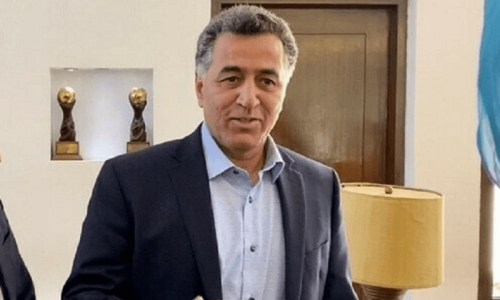LAHORE, Jan 11: People on both sides of the border are against war, hate terrorism and want peace, according to Asma Jehangir, the chairperson of the Human Rights Commission of Pakistan.
“Surprisingly, we got a very positive and friendly response to our maiden peace initiative (launched) after the Mumbai tragedy,” Ms Jehangir told newsmen at Wagah on Sunday after returning from Amritsar.
She said that she and South Asian Free Media Association (Safma) secretary-general Imtiaz Alam had attended a one-day inter-faith conference, along with representatives of major Indian political parties. The event was arranged by the Pak-Bharat Dosti Munch.
Another 25-member delegation of Pakistani parliamentarians, journalists and people from other walks of life would attend a five-day peace conference in New Delhi from Jan 21 at the invitation of the Indian chapters of Safma and Sahr (South Asia Human Rights) “to emphasis resumption of the composite dialogue process,” said Ms Jehangir.
The Amritsar conference, she said, was a good opportunity to remove misunderstandings in the wake of the Mumbai attacks.
“The people of India were sceptical. We categorically told them that no political party in Pakistan, whether or not in parliament, was against the peace process between New Delhi and Islamabad. We categorically told them that no political force in Pakistan wanted war. We told them that we are all victims of terrorism,” she said.
According to her, participants in the Amritsar conference criticised Indian media’s inflammatory role and unanimously condemned the Mumbai terrorist attacks and sympathised with families of the victims.
She stressed the need for a joint India-Pakistan investigation and judicious prosecution of criminals, Ms Jehangir asked: “Why can’t we handle our own affairs (in a civilised manner)?”
She and Imtiaz Alam proposed that Pakistan and India should strengthen the joint anti-terrorism mechanism and initiate a joint investigation to bring criminals involved in the attacks to justice.
They urged Pakistan to take action against terrorists and called upon India and the media in both countries to show restraint.
Expressing concern over war-mongering, they rejected war as a means to solving inter-state disputes and said that India and Pakistan should fight terrorism through understanding and cooperation.
Mr Alam welcomed Islamabad’s admission of the involvement of some Pakistanis in the Mumbai attacks.
He handed over a statement among reporters that said that Pakistani peace activists “share our heart-felt grief with the families of victims and the brotherly people of India.
Terming the Mumbai attack paradigmatic, the statement said: “Patterns of behaviour must change … for the sake of survival of Saarc states. This change cannot come through war. It must come through cooperation.
“Pakistan and India must jointly investigate and find judicious ways to prosecute the culprits. Both the countries must strengthen joint anti-terrorism mechanism … and fully cooperate with each other to fight … terrorism.
“Saarc must evolve regional mechanisms and institutions to collectively fight terrorism, cross-border crimes, smuggling, narcotics and a judicial forum to prosecute the terrorists and criminals wanted by one state or the other.
“We must forge friendship and burry the hatchet for ever.”














































Dear visitor, the comments section is undergoing an overhaul and will return soon.